Author: tmcsaunders
Protected: Sustained & Soothed: 42 & The Cookbook
Protected: Sustained & Soothed: October 25, 2019
Protected: Sustained & Soothed: Part II of How My Hospice Experience Began
Protected: Sustained & Soothed: How My Hospice Experience Began
Introducing Slam Poetry to the High School ELA classroom
I’m late to the slam movement, but I am fast falling in love. I introduced two of my classes to it this semester, and several students and I now share new poems that we find with each other. I’ll be honest though, slam poetry is risky.
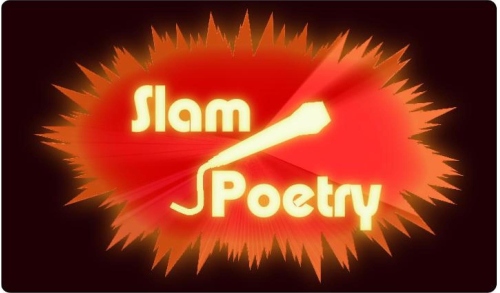 Part of what defines it is the fact that it is raw emotion about painful events–and such raw emotion is rarely pretty or grammatically correct or edited for polite society. Slam poetry is equal parts performance, metaphor, pacing, story-telling, and advocacy. It will sucker punch you when you least expect it, either with its painful honesty or its biting ironic wit.
Part of what defines it is the fact that it is raw emotion about painful events–and such raw emotion is rarely pretty or grammatically correct or edited for polite society. Slam poetry is equal parts performance, metaphor, pacing, story-telling, and advocacy. It will sucker punch you when you least expect it, either with its painful honesty or its biting ironic wit.
Below are five of my favorite slam poems, all of which I have played in my classroom. Yes, the language is often sailor-like and salty, but that’s part of their power. Slam poetry is about letting go, and letting people who don’t know your pain or frustration share it.
(1) Taylor Mail: If you’re a teacher, and you haven’t been privvy to Taylor Mali’s  “What Teacher’s Make,” you’ll want to bookmark this and watch it about halfway through test season (what we used to call ‘spring.’) It’s statement of what teachers really do, and what we really make. Mali’s other work is great, but as a middle school teacher, he sums up why we do what we do, and does it with power and pizazz. Here’s the text of it, but you MUST watch him perform it. Goosebumps. I promise. (You can find Mali on Twitter at @
“What Teacher’s Make,” you’ll want to bookmark this and watch it about halfway through test season (what we used to call ‘spring.’) It’s statement of what teachers really do, and what we really make. Mali’s other work is great, but as a middle school teacher, he sums up why we do what we do, and does it with power and pizazz. Here’s the text of it, but you MUST watch him perform it. Goosebumps. I promise. (You can find Mali on Twitter at @
(2) Janette McGhee Watson: If you’ve ever wanted to wander through a woman’s head  and find out what heartbreak and weak and absent fathers do to our psyches, “I Waited for You” by Janette McGhee Watson will take you there. Unapologetically and artistically, her poem is her wedding vows, and they are forceful and brutally honest. I have so much respect for her; it’s a ten minute treatise on why she is who she is, and why she is marrying the man in front of her, and it is as beautifully painful as anything you’ll see in a long time. You’ll need to watch this a few times to get all of it, as her rapidfire word play is sometimes difficult to catch, but oh, is it ever worth it! You can find her and more of her work here.
and find out what heartbreak and weak and absent fathers do to our psyches, “I Waited for You” by Janette McGhee Watson will take you there. Unapologetically and artistically, her poem is her wedding vows, and they are forceful and brutally honest. I have so much respect for her; it’s a ten minute treatise on why she is who she is, and why she is marrying the man in front of her, and it is as beautifully painful as anything you’ll see in a long time. You’ll need to watch this a few times to get all of it, as her rapidfire word play is sometimes difficult to catch, but oh, is it ever worth it! You can find her and more of her work here.
(3) Jesse Parent – “To the Boys Who May One Day Date My Daughter” 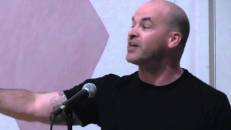 is just flat funny. Teenagers will love it because it’s a dad’s message to boys who, as the title says, may want to date his daughter. It’s a message every parent has thought at some point, and as a teacher, I think it’s a very cool thing for our kids to know that this is how we feel about them. Funny, threatening, loving, and hopeful, it’s great fun, with only a little bit of controversial content. (Jesse tweets @jesseparent.)
is just flat funny. Teenagers will love it because it’s a dad’s message to boys who, as the title says, may want to date his daughter. It’s a message every parent has thought at some point, and as a teacher, I think it’s a very cool thing for our kids to know that this is how we feel about them. Funny, threatening, loving, and hopeful, it’s great fun, with only a little bit of controversial content. (Jesse tweets @jesseparent.)
(4) Amina Iro and Hannah Halpern (@hanhalp), the two girls who perform this poem, have taken their personal experiences and differences and made the point that those things aren’t all that important in the grand scheme of things. With the Middle East still (always?) in the forefront of the news, their poem is and likely will be, timely for a long time. Check out their take on the Arab-Israeli conflict here.
(5) As a trans-racial adoptive mom, Javon Johnson’s “cuz he’s black” broke my  heart, and forced me to look at my son differently. Every person of color in the room will nod and agree, even if their white peers don’t. With so much talk about racism in the media today, it’s important to remember that you cannot dictate to another person what their own experience is. This poem helps teach that lesson. You can connect with Johnson on Twitterat @javonism.
heart, and forced me to look at my son differently. Every person of color in the room will nod and agree, even if their white peers don’t. With so much talk about racism in the media today, it’s important to remember that you cannot dictate to another person what their own experience is. This poem helps teach that lesson. You can connect with Johnson on Twitterat @javonism.
6. Kai Davis: This last one might require special permission to use in the classroom depending on where you are because of the ferocity of the language, but it is so worth it. Kai Davis’s “I Look Like” has a lot of f-bombs and n-words, but the message and the performance and the wordplay are near perfection. It’s about the judgement faced by smart kids of color by both their white and black peers, and how this one spunky young woman refuses to sell out to anyone. Kai tweets at @KaiDavisPoetry.
depending on where you are because of the ferocity of the language, but it is so worth it. Kai Davis’s “I Look Like” has a lot of f-bombs and n-words, but the message and the performance and the wordplay are near perfection. It’s about the judgement faced by smart kids of color by both their white and black peers, and how this one spunky young woman refuses to sell out to anyone. Kai tweets at @KaiDavisPoetry.
Slam poetry’s increasing popularity makes it an amazing classroom tool, and because of its tendency toward performance, self-evaluation and clever phrase turning, can appeal to a wide range of people. However: as a teacher, be cautious. These poems and their honesty and salty language are not for every classroom.
If I’ve missed a good one, let me know in the comments!
The Seven Best Love Poems of all Time
It’s time we had the talk. The love poem talk.
As a teacher, I love to encourage my kids to write, but Lord help me when they bring me their love poetry to look at .
When I make them write poetry, I tell them that they can write about anything they want, as long as it isn’t romantic love. “If you can out-sonnet Shakespeare, then go for it; if not? Pick a different subject.” Then I tell them that if they give me a teenage love poem to read, I will make confetti out of it.
If the poem has the phrase “there for me” in it, I’ll add glitter and use it at their next parent conference.
So, this being National Poetry Month, we’re going to get the obvious out of the way. If you love poetry, there are love poems you love. This is not complicated, unlike love itself, whose complication is infinite and ever-changing.
Here are my favorites, and why I love them so much. Can I use the word ‘love’ again? I’d love to, thanks.
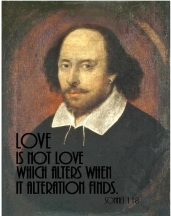
(1) Shakespeare’s sonnet 114. Otherwise known as “Let me not to the marriage of true minds admit impediments.” One of Will’s best known, it basically says that love isn’t going to break if things get in its way. It’s not going to change for the worse when bad things happen. If it’s real love, it’ll get stronger, and the fact that you’re reading the poem is proof of it. The fact that we study it is proof that The Bard was right. When it comes to love poems, he wrote more than a hundred of them, and they are all worth reading, especially if you are both in love and a poetry geek.
(2) The Seafarer–This poem may seem like an odd choice for a list of love poems, but the Anglo-Saxon Bard who wrote it was no stranger to the heart ache love can cause, especially if the thing you love does not love you back. The speaker’s one true love is the ocean, which we all know is capricious and unrelenting. Not great traits for a lover to have, but we don’t pick who or what we love, do we?
(3)I Love You, by Roy Croft This poem has some dubious origins if Wikipedia is to be 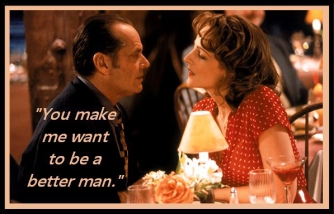 believed, but regardless of who wrote it, it maps out why we love the people we do. It’s not just about them, it’s about who we become when we’re with them. Remember Jack Nicholson’s “You make me want to be a better man?” speech? That’s essentially what this poem is. It’s simple, free verse, and doesn’t require much reading between the lines to understand. I think we had it read at our wedding, because it’s just that awesome of a poem (and my memory is just that out of whack!)
believed, but regardless of who wrote it, it maps out why we love the people we do. It’s not just about them, it’s about who we become when we’re with them. Remember Jack Nicholson’s “You make me want to be a better man?” speech? That’s essentially what this poem is. It’s simple, free verse, and doesn’t require much reading between the lines to understand. I think we had it read at our wedding, because it’s just that awesome of a poem (and my memory is just that out of whack!)
(4) Annabel Lee, by Edgar Allan Poe My favorite poem of all time, b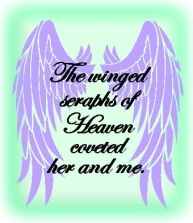 y one of my favorite writers. It’s a sad fairy tale love story about love that goes on beyond the “sepulchre there by the sea” into eternity. When I was in 6th grade or so, I figured out that “Annabel Lee” rhymed with Tracy Marie, and that made my little heart explode. Even now, when I recite it, I have to sub my name for Annabel Lee’s name at least once. And it still gives me a goose bump or two. Like much of Poe’s love poetry it mourns the loss of his love, but does so in a beautiful lyrical style with sound effects and rhythm as only Poe can do.
y one of my favorite writers. It’s a sad fairy tale love story about love that goes on beyond the “sepulchre there by the sea” into eternity. When I was in 6th grade or so, I figured out that “Annabel Lee” rhymed with Tracy Marie, and that made my little heart explode. Even now, when I recite it, I have to sub my name for Annabel Lee’s name at least once. And it still gives me a goose bump or two. Like much of Poe’s love poetry it mourns the loss of his love, but does so in a beautiful lyrical style with sound effects and rhythm as only Poe can do.
(5) 1st Corinthians 13:4-8. These are the “Love is patient” verses, and might be the most recited passage in the history of modern weddings. It is a Biblical definition of what love is and isn’t, and no matter where you are in your spiritual life, you have to admit that the definition is pretty spot on. Now, there are about a gazillion different translations for the Bible, and while some are better than others, your choice as to a favorite is exactly that. The link I added here allows you to choose among MANY translations.
(6) Sonnet 43, Edna St.Vincent Millay Many might argue against this choice for a great love poem, but hear me out. Each of us has a lost love story. A broken heart is good for someone because of all the lessons that come with it, but most sad love poetry is all “please come back, baby.” Millay is wise enough to know that such wishes only create more problems, and that broken hearts and loves that didn’t work out should stay in the past, sighing and tapping on the window pain.
(7) To Althea, From Prison” by Richard Lovelace. Love doesn’t hold us back,  according to Richard Lovelace, it gives us the freedom of flying angels. Perhaps best known for its “Stone walls do not a prison make” line, most people have at least heard of this poem. He admits to loving the physical relationship with his beloved Althea, and offers the idea that true love is the most precious kind of freedom. Plus, he uses the verb tipple. How can you not love that?
according to Richard Lovelace, it gives us the freedom of flying angels. Perhaps best known for its “Stone walls do not a prison make” line, most people have at least heard of this poem. He admits to loving the physical relationship with his beloved Althea, and offers the idea that true love is the most precious kind of freedom. Plus, he uses the verb tipple. How can you not love that?
Worksheets for some of these poems are in progress, and will be posted in my Teachers Pay Teachers Store when they’re done!
What’s your favorite poem? Comment with a link below!
Respect the Verse: How to get the most out of the poems you read
Understanding poetry truly isn’t as hard as people make it out to be. With a little coaching, some jargon, and some practice, it’s a pretty easy thing.
And to appreciate it doesn’t mean that you have to learn every little thing about poetry. Trust me, there’s too much. And even poetry nerds like me don’t have it all down.
Listed below are the basics you need to get the most out of the verse you read.
- Read with the punctuation marks. Just because a line breaks doesn’t mean there’s a pause. Pause where the commas and end marks are. If there’s no punctuation, it may take a few times through the poem to figure out where to pause. Look at this piece of Shakespeare’s “My Mistress Eyes are Nothing Like the Sun.” Notice that it makes WAY more sense if you DON’T pause at the end of the line!
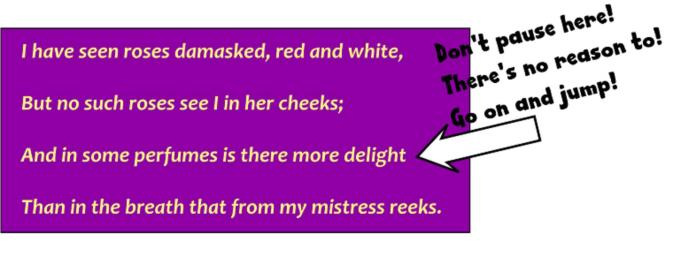
- Get used to re-reading. To really get a poem, you have to read it a few times. Even if it appears simple on the first pass, there will be lots more to it on the second and third time through.
- Pay attention to line breaks, capitalization, and structure. Lines are broken where they are on purpose to add emphasis or to move your eyes down the page. Words that the poet capitalizes are words that are Important, especially if it’s something that’s not usually given a capital letter.
- How it sounds helps create a feeling. Lots of soft letters in soft sounding words-
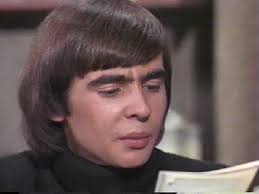
You have to hear him say “little metal bottletops.” Click here. I’m not sure why this is so funny, but it is. -m, n, s, r, l–will help create a soft feeling. Hard letters–d, t, k, p–create harsher sounds. Those sounds can mimic water or wind, or weapons and warfare depending on their usage. Those sounds create feelings, which in turn help you as the reader, develop meaning.
- Make a connection. You should be able to find some sort of connection with every poem you read. Does it remind you of your Great Aunt Tilly? Your favorite superhero? Make you question something you heard at church? Make you feel sad or angry or nostalgic? Those connections are the whole purpose of literature; poets write to express thoughts and feelings, and we read to better understand our own.
Got anything to add? Let me know about it in the comments? Like what you read? Share this somewhere! Happy National Poetry Month!
Introduction to Poetry
Part of the frustration of any literature teacher is the groaning chorus of poetry haters who are not excited about the poetry unit. To help this, I try to introduce poetry via song lyrics and fun poems. One of my favorite fun poems is Billy Collins’ “Introduction to Poetry” which presents the problems of teacher expectations running into students.
It is perfect for teaching assonance, metaphor, and free form structure. And it nails #thestruggleisreal feeling teachers get when trying to get students to read beyond the surface of a poem.
I’m in the process of creating a worksheet for this poem geared toward high school students. I’ll email the first five requests in the comments a free PDF copy of it when it’s done! Everyone else will be able to buy it from my Teachers Pay Teachers store when it’s done.
Enjoy!
Introduction to Poetry
Seven Reasons to Celebrate National Poetry Month
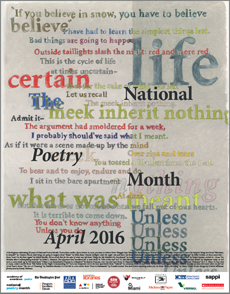 Started in 1996 by the Academy of American Poets, National Poetry month is a special kind of nerd thing.
Started in 1996 by the Academy of American Poets, National Poetry month is a special kind of nerd thing.
Many people are nerds for science fiction, gaming, cosplay, computers, coding, music, musicals, TV shows, fan fiction, etc. Those of us who nerd for poetry get pretty excited that we have a whole month dedicated to the thing we love that so many other less fortunate people don’t.
If you don’t love poetry, you might want to come back in May.
If you love poetry, or love someone who loves poetry, this spot will be the place to be, as in the next 29 days, we’re going to look at the world of poetry. Where it came from, how we study it, why we study it, and why more people should stop and love it. So, in true modern blog fashion, here are some reasons you should celebrate national poetry month.
- You remember something about poetry because a poetry geek pounded it into your head.That geek was probably one–or four–of your high school English teachers. Each of mine were amazing women who pushed me to write not just for grades, but for passion. That they cared enough to make me remember that sonnets have fourteen lines and haiku three, means something. And that you remember it means something too.
- You might admit to having a favorite poem if forced to. We all have a favorite book, and if we’re the smart educated sort, we might even have a favorite poem. I do. I have several actually, but the one that will always top the list is Edgar Allan Poe’s “Annabelle Lee.” I memorized it in middle school, and have tucked my kids into bed with it, despite its depressing story.
- You have actually liked a song for the lyrics and not the music. There are some performers whose lyrics are just gut wrenching. I bet you can name a few songs whose lyrics were the perfect backdrop for an event in your life. Like it or not, those lyrics are poetry. Everything from sappy country to hard rock and rap are, at their heart, poems.
- You want to impress your significant other. Every romantic wants someone to think they’re beautiful enough to have a sonnet written for them. I had a student once who, as part of his poetry memorization project, recited one of Shakespeare’s sonnets to a girl in his class, gave her a rose, and sat down. I’m pretty sure they’ll both remember the absolute amazingness of that two minutes for the rest of their lives. I don’t remember the student’s name, but I can see him, on one knee in front of her, one hand on his heart and one holding out that rose.
- Educators could use the support. There are poems about everything. Find some, and encourage your children, your friends, your family, to read them. Teachers can use all the help we can get to encourage our students to dig a little deeper, and not be embarrassed to embrace something like poetry.
- Poetry is a living, beautiful thing that grows and changes and demands that you pay attention to it. I stole this from a teacher at a training years ago: Good literature is like a good girl. She doesn’t kiss on the first date. You want something more than company? You’re going to have to work for it, earn it. With poetry, that work means you may have to read a piece several times to really “get it.” My favorite poem for this lesson is William Cullen Bryant’s “Thanatopsis,” which my 10th grade literature teacher made us memorize the last stanza of. In her honor, I make my juniors memorize it too.
- The Academy of American Poets has it all planned out for you. They have a “poem a day” email that will bring you cool poetry you’ve likely never read before straight into your in-box on the daily, so you don’t even have to go looking for it. They have lesson plans for you teachers, and poems for every event and occasion you can imagine. Some of the best poets are represented on their website. You should check them out.
Don’t be embarrassed. Poetry is a really cool thing. Trust me. Celebrate it. You won’t regret it!